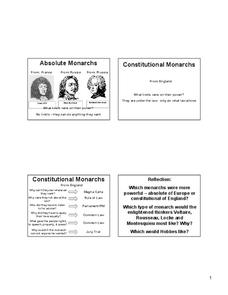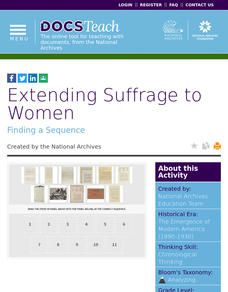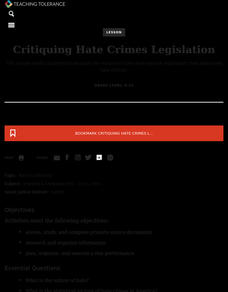Curated OER
Civil Liberties and War Powers: Korematsu v. United States
Eleventh graders compare and contrast Supreme Court decisions dealing with the application of civil rights during times of war, with emphasis on discrimination and detention. Working in groups, 11th graders review cases and analyze how...
Curated OER
Hiibel vs. Sixth Judicial District Court of Nevada
Did Hiibel's arrest and conviction for not telling a police officer his name violate his rights? Have your learners read a short description of the case and answer the comprehension questions that follow. Resource links and...
Curated OER
Arrest- A Legal System Simulation
What would your class do if a police officer arrested a student in class? This is exactly the anticipatory set that gets students engaged in a unit on the legal system. The plan is to get the officer to simulate an arrest, and then guest...
National Endowment for the Humanities
Background on the Patriot Attitude toward the Monarch
Learners explain the Patriot attitude toward the British monarchy, which helps them embrace the Founders' reluctance to have a strong executive under the Articles of Confederation as well as their desire to build in checks of executive...
Curated OER
Branches of the Government: Jeopardy Game
Jeopardy games are great ways for students to review concepts in an interesting way. This Game covers the Amendments, 3 Branches of US Government, and miscellaneous terms related to American independence and law.
Curated OER
The Constitution: The Country's Rules
Pupils become aware of the Constitution and why it is important. In this early government lesson, students compare the Constitution to the class rules. They are both set in place so that we all stay safe and have fun. Pupils draw...
Curated OER
Electronic Surveillance: Unlawful Invasion of Privacy or Justifiable Law Enforcement
Students state values and analyze them and the values of other students as it relates to the issue of individual privacy. They develop constitutional provisions which address issues relating to privacy with particular reference to item...
Curated OER
George Washington and the Rule of Law
students compare The rule of law with the rule of men and consider life under each of these types of governments.In this government lesson, students read a primary source to examine the importance of the rule of law.They will also answer...
Curated OER
Due Process
Students explore the concept of due process. In this American law lesson, students view a 9-slide PowerPoint presentation on the topic and then respond to 3 discussion questions about the 5th and 14th amendments.
Curated OER
Absolute Monarchs and Constitutional Monarchs
For this absolute monarchs and constitutional monarchs study guide worksheet, students read a brief overview pertaining to the topic and then respond to a reflection question.
Curated OER
The False Parliamentarism of 1791 (3rd Canadian constitution)
Students gain an understanding of the concept of false parliamentarism after the Constitutional Act. They, in groups, represent different members of government as they draft, debate and try to pass a bill into law.
Deliberating in a Democracy
Marriage and the State
What defines marriage in society? Scholars investigate the moral and legal arguments of what defines marriage. They analyze different marriage traditions and social customs around the world along with Supreme Court decisions. Individuals...
Teaching Tolerance
The True History of Voting Rights
Explore what voting rights really are in an intriguing instructional activity that explores the history of American voting. The resource examines the timeline of voting rights in the United States with group discussions,...
Constitutional Rights Foundation
Elections, Money, and the First Amendment
Those who spend the most, win. Academics read informational text, participate in group discussion, and defend campaign reforms to understand the correlation between money, the First Amendment, and election results. The resource...
DocsTeach
Extending Suffrage to Women
Votes for women! The activity highlights the push for the Nineteenth Amendment giving women the right to vote. High school scholars learn how the Fifteenth Amendment giving African American men the right to vote helped to spark the...
Judicial Branch of California
Fayette v. Take Two: The First Amendment
An informative lesson provides scholars the opportunity to study a Supreme Court case regarding the First Amendment and make a ruling with the members of their group. Class members also participate in group discussion and prepare a...
Judicial Learning Center
The Appeal Process
Why doesn't the Supreme Court hear testimony from witnesses? How do they complete an entire proceeding in less than two hours? A helpful lesson guides scholars of criminology through these and other questions by explaining how appeals...
Teaching Tolerance
Critiquing Hate Crimes Legislation
The high school lesson explores what hate crimes are and how the government has responded to those crimes. Academics read legislation, analyze political cartoons, and complete hands-on-activities to understand what motivates individuals...
Constitutional Rights Foundation
270 Votes to Win: The Electoral College in the United States
What exactly is the Electoral College and how does it work? The lesson is part of a larger series on government that explains what the Electoral College is and how it helps determine an election winner. Academics participate in...
College Board
Balance of Power Between Congress and the President
Three branches of government help create a system of checks and balances. A helpful resource provides a series of articles regarding the balance of power between the legislative and executive branches of government. Historians answer...
Constitutional Rights Foundation
Criminal Justice in America
The allure of true crime television shows often leads to intrigue of the criminal justice system. Using a six-unit curriculum, learners explore criminology and the justice system in the United States. Topics include the police, trial...
Carolina K-12
Citizens United v. Federal Election Commission & the First Amendment
Should Congress limit how much a corporation spends to support a political candidate? Here is a fantastic lesson plan and activities to help young citizens approach this question.
Syracuse University
Women's Suffrage Movement
Women gained the right to vote in the twentieth century, but the fight for equality dates back centuries. Using an invitation to an 1874 suffrage convention, eager historians consider the motivations behind supporters of the suffrage...
Judicial Branch of California
The Power of the Press: The First Amendment
Was what happened in 1886 at the Haymarket riot a crime or a case of xenophobia? Using political cartoons from the time, young historians consider the role the media played in anti-labor sentiment during the time and how that influenced...
Other popular searches
- Constitutional Law Games
- Discuss Constitutional Law
- Constitutional Law Privacy
- Constitutional Law Jeopardy
- Constitutional Law Lessons
- Constitutional Law Cruel
- Constitutional Law Syllabus

























